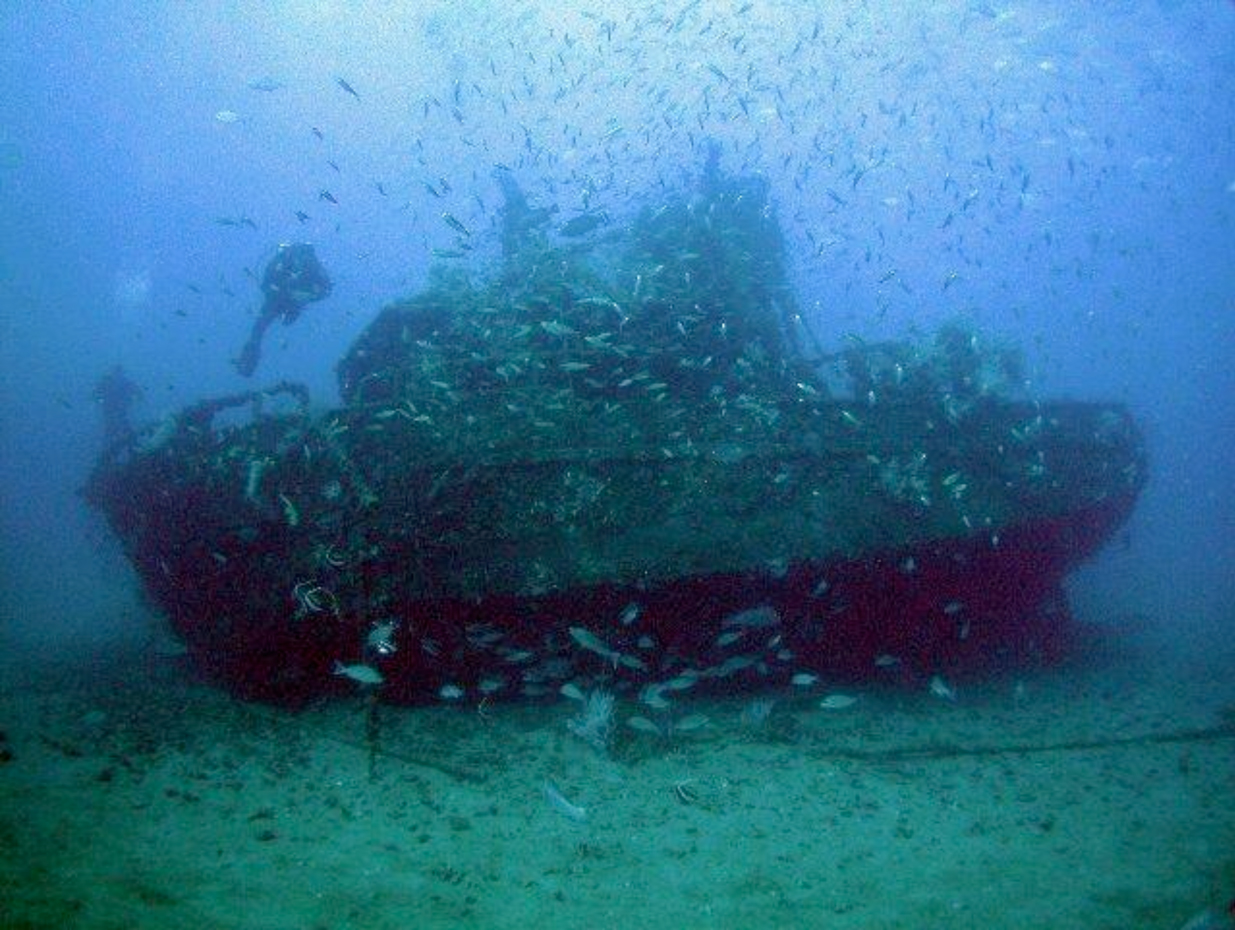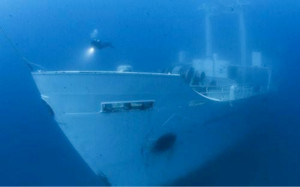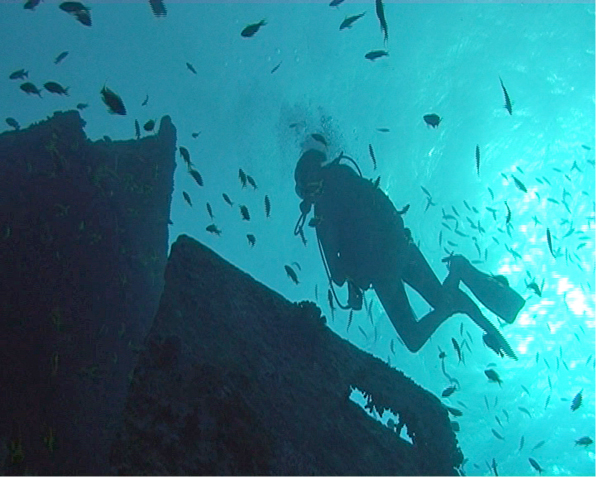Marine Life & Conservation
ARTIFICIAL REEFS – Do we need them?

Reefs around the world have taken a terrible toll from all our marine exploits. Over fishing, pollution, coastal development, diver damage, ships’ anchors….. the list goes on. And now on top of all this, the reefs are further dying through climate change and acidification. Warm water coral reefs are the most affected but many of the same pressures are felt on temperate reefs too.
World wide, coral reefs are home to approximately 25 percent of the animals and plants that live in the ocean. They protect vulnerable coastlines from raging seas; they are nursery grounds for many species as well as permanent homes for countless fish and invertebrates. More than 500 million people depend on reefs for their primary source of protein. They provide us divers with magnificent backdrops to our underwater adventures. The tourist trade over many parts of the world depend heavily on healthy and vibrant coral reefs for their visitors to enjoy. And yet we systematically crush them back to white lifeless limestone.
As the oceans’ ecosystems fall into serious decline, so we look at ways of addressing the balance. Artificial reefs are not new. Countries around the world have been making them in one form or another for generations. But here in the UK, as is too often the case, we are sadly lagging behind in our efforts to make these new potential reefs work – not only for us, but for the marine environment in general.
There is a group people trying to make some changes, and this is their story so far.
Weymouth & Portland Wreck to Reef Project (http://www.wrecktoreef.co.uk)
Weymouth and Portland Wreck to Reef is the non-profit community group that was originally set up to obtain permissions to source and to sink a single ship as an artificial reef at a location to the east of Weymouth and Portland.
 Because of the difficulty in obtaining those permissions it soon became apparent that the way forward was to obtain permissions for a square kilometre of sea bed where we could sink not just one, but two ex-naval warships. Along with other inert reef material creating a reef sanctuary that it is hoped would be the first of many in the UK.
Because of the difficulty in obtaining those permissions it soon became apparent that the way forward was to obtain permissions for a square kilometre of sea bed where we could sink not just one, but two ex-naval warships. Along with other inert reef material creating a reef sanctuary that it is hoped would be the first of many in the UK.
As of today hundreds of artificial reefs have been created throughout the world, ranging from small concrete structures in Kerala India http://www.indiaenvironmentportal.org.in/node/10479 to huge aircraft carriers http://artificial-reefs.blogspot.com/2006/05/navy-ex-aircraft-carrier-uss-oriskany.htm all without exception having a positive effect on the marine environment and local business in general, both short and long term.
In 1997 it was Tina Thomas of Portland Oceaneering that first started to put any real effort into the possibilities of the Weymouth and Portland area having its very own Wreck to Reef. It has to be said, it was very much a one woman crusade for several years. After repeatedly hitting a brick wall, Tina had to make the choice between her own business and the reef project.
In more recent years, Lisa Wallace of Silent Planet continued to drive the idea forward, and spent a couple of years and a lot of her resources on producing evidence that actually showed for the first time just how important the diving industry as a whole was to the Weymouth and Portland area. Unfortunately, but not surprisingly, Lisa was faced with the same dilemma Tina had faced years before.
 As with most of us reading this, life is busy and with those of us with businesses, we all know just how precious and valuable free time is. Although, at the time we all wished Tina and Lisa well, they were very much left to get on with it.
As with most of us reading this, life is busy and with those of us with businesses, we all know just how precious and valuable free time is. Although, at the time we all wished Tina and Lisa well, they were very much left to get on with it.
It must be acknowledged that without Tina Thomas and Lisa Wallace , we would still be tying up our running shoes, but instead we, our industry and our community has the baton firmly in our grip and can move forward with this awesome project.
Sean Webb and Marcus Darler of O’Three Ltd, and Dale and Ron Spree of Fathom and Blues are two of those companies that gave lots of verbal support to Weymouth and Portland’s very own artificial reef concept, but were both busy in keeping their own businesses on track. Although Fathom and Blues and O’Three continue to do well, it was plain to see just how diving in general was on the decline in our area.
Learning from the past (and that is not a criticism) O’Three and Fathom and Blues both realised early on that things would soon fall flat if firstly, they didn’t get somebody independent to put some consistent time into it (and be prepared to pay for that time), and secondly, to get as much support as they could not just within our industry, but further afield.
It was at this stage Neville Copperthwaite’s name was put forward as a possible project co-ordinator. There are people who talk and people who do, and Neville is well and truly one of the latter. If anyone can get this project further along, then it’s Neville Copperthwaite. In gathering all of the existing data and the new information he has collected and his ability to find the right doors to knock on and then open, at such an early stage in his involvement, is amazing.
Aims & Goals
Overview
The general national decline within the diving industry has been exacerbated in Weymouth and Portland by three things: the sinking of HMS Scylla in Plymouth; the building of an accessible launching facility in West-Bay at Bridport; and a ban on diving the HMS Hood in Portland Harbour (for safety reasons).
Drawing on the experiences and the resulting benefits of previous man-made artificial reefs, notably in Plymouth but also around the world, it is believed that this project will help redress the economic down-turn within our diving industry.
Worldwide
Man-made artificial reefs are not a new thing by any means. The Japanese have been building them for over four hundred years to improve their fish stocks (they’re determined they won’t run out of sushi). Canada, America and Australia have been sinking ships as diver and angling attractions for up to thirty years or more. Brazil is currently manufacturing concrete reef balls which have pioneered reef restoration throughout the world. In India, villagers make triangular concrete structures utilising the very sand from their beaches, then they sink them to redress the damage done by commercial trawling.
The list goes on.
In fact, only a few miles from where we are today, a reef is being constructed by a New Zealand company to facilitate wave formation for surfers. This is happening now, off Bournemouth beach in Dorset, UK.
Even closer to us in Poole Bay, Dr Ken Collins of Southampton University has been monitoring an artificial reef that he had constructed back in the eighties, and if any of you had been to one of his fascinating lectures on this subject, you would have seen the resounding success of the increase in marine life in what was previously a relatively barren area. The upshot is that artificial reefs work for whatever is asked of them.
There has been much academic research done on this subject worldwide, including Southampton University and all this is well documented. By and large, this research shows that provided the obstacles used for artificial reefs are environmentally clean, and are heavy enough not to migrate from where they are placed, then the biodiversity of that area will increase dramatically.
Ethos
But we don’t want to profess to you that we are doing this solely for the environment. That would be wrong, and we are not. Economics is the driving force behind this. The diving industry in Weymouth and Portland is a shadow of its former self. For instance, in 2003 there were twenty four dive charter boats operating out of the area… and now there are less than half that number.
However, having said that, marine life will still flourish on an artificial reef, no matter what the politics.
And talking of politics, we are under no elusions as to how difficult it will be to secure all the necessary permissions. There will be the Crown Estates to deal with, the MCA, Southern Sea Fisheries, English Nature and a host of other organisations. This fragmentation tempts us to suggest on a broader note that artificial reefs could be used as an integrated management tool within the European Coastal Zone or at least within the C-scope project. This would have the effect of streamlining and encouraging the whole business – and all this before persuading the MOD to part with a ship, let alone finding funding for the project – but it’s been done before, and it can be done again.
Support
We have already received practical support and enthusiasm from Weymouth and Portland Borough Council.
Gary Fooks, the 2012 Olympic Legacy Director, is including the project as part of his plans so that a world class dive venue can run alongside a world class sailing venue. The Portland Partnership and Portland Gas Ltd are working with us and will allow us to install a viewing system between the proposed reef and an interpretation centre on Portland and elsewhere. Southampton University, a world leader in artificial reef research, will become involved in our environmental impact studies.
Final Thought
Just a thought to leave you with – Japan has artificial reefs covering some twelve percent of its coast. It sees its artificial reef program so economically important that its annual reef budget is equal to our annual military budget.
E-Petition http://www.wrecktoreef.co.uk/e-petition
Through the three year process of obtaining permissions to sink two destroyers and create artificial reefs, Weymouth and Portland Wreck to Reef have by coincidence created a new way to manage an area of sea-bed by the people for the people.
It has been suggested that Weymouth and Portland Wreck to Reef now has a blueprint that should be adopted across the whole of the United Kingdom.
The jewel in the crown of these reef sanctuaries is of course the once jewels of our naval history, our warships.
Our ex-naval ships could be cleaned and made ready responsibly here in the UK and would help create much needed habitats for our ailing marine environments and bring decades of revenue to our coastal communities.
The UK is sadly out of step with the rest of the world with regards to giving ships as ‘deeds of gifts’ to any organisation. Portugal and Thailand sunk four ships in 2012, with Portugal planning to sink another two warships this year.
It is hoped by signing this petition you will help Wreck to Reef change the British Governments view and, by deed of gift, give us at least one vessel.
Marine Life & Conservation
Double Bubble for Basking Sharks

 The Shark Trust is excited to announce that, for two more days only, all donations, large or small, will be doubled in the Big Give Green Match Fund!
The Shark Trust is excited to announce that, for two more days only, all donations, large or small, will be doubled in the Big Give Green Match Fund!
Donate to Basking in Nature: Sighting Giants
The Shark Trust is hoping to raise £10k which will be doubled to £20k. This will go towards Basking in Nature: Sighting Giants. And they need YOUR help to reach they’re goal.
The Shark Trust’s citizen science project is to monitor and assess basking sharks through sightings; encouraging data collection, community engagement, and promoting nature accessibility. This initiative aims to enhance health and wellbeing by fostering a deeper connection with British Sharks.
Campaign Aims
- Increase citizen science reporting of Basking Sharks and other shark sightings to help inform shark and ray conservation.
- Provide educational talks about the diverse range of sharks and rays in British waters and accessible identification guides!
- Create engaging and fun information panels on how to ID the amazing sharks and rays we have on our doorstep! These can be used on coastal paths around the Southwest. With activities and information on how you can make a difference for sharks and rays!
- Promote mental wellbeing through increasing time in nature and discovering the wonders beneath the waves!
Donate, and double your impact. Click Here
Marine Life & Conservation
Leading UK-based shark conservation charity, the Shark Trust, is delighted to announce tour operator Diverse Travel as a Corporate Patron

 Corporate Patrons provide a valuable boost to the work of The Shark Trust. The Trust team works globally to safeguard the future of sharks, and their close cousins, the skates and rays, engaging with a global network of scientists, policymakers, conservation professionals, businesses and supporters to further shark conservation.
Corporate Patrons provide a valuable boost to the work of The Shark Trust. The Trust team works globally to safeguard the future of sharks, and their close cousins, the skates and rays, engaging with a global network of scientists, policymakers, conservation professionals, businesses and supporters to further shark conservation.
Specialist tour operator Diverse Travel has operated since 2014 and is committed to offering its guests high quality, sustainable scuba diving holidays worldwide. Working together with the Shark Trust will enable both organisations to widen engagement and encourage divers and snorkellers to actively get involved in shark conservation.
“Sharks are truly at the heart of every diver and at Diverse Travel, we absolutely share that passion. There is nothing like seeing a shark in the wild – it’s a moment that stays with you forever!” says Holly Bredin, Sales & Marketing Manager, Diverse Travel.
“We’re delighted to celebrate our 10th year of business by becoming a Corporate Patron of the Shark Trust. This is an exciting partnership for Diverse and our guests. We will be donating on behalf of every person who books a holiday with us to contribute towards their vital shark conservation initiatives around the world. We will also be working together with the Trust to inspire divers, snorkellers and other travellers to take an active role – at home and abroad – in citizen science projects and other activities.”
Paul Cox, CEO of The Shark Trust, said:
“It’s an exciting partnership and we’re thrilled to be working with Diverse Travel to enable more divers and travellers to get involved with sharks and shark conservation. Sharks face considerable conservation challenges but, through collaboration and collective action, we can secure a brighter future for sharks and their ocean home. This new partnership takes us one more valuable step towards that goal.”
For more information about the Shark Trust visit their website here.
For more about Diverse Travel click here.
-

 News3 months ago
News3 months agoHone your underwater photography skills with Alphamarine Photography at Red Sea Diving Safari in March
-

 News3 months ago
News3 months agoCapturing Critters in Lembeh Underwater Photography Workshop 2024: Event Roundup
-

 Marine Life & Conservation Blogs3 months ago
Marine Life & Conservation Blogs3 months agoCreature Feature: Swell Sharks
-

 Blogs2 months ago
Blogs2 months agoMurex Resorts: Passport to Paradise!
-

 Blogs2 months ago
Blogs2 months agoDiver Discovering Whale Skeletons Beneath Ice Judged World’s Best Underwater Photograph
-

 Gear Reviews2 weeks ago
Gear Reviews2 weeks agoGEAR REVIEW – Revolutionising Diving Comfort: The Sharkskin T2 Chillproof Suit
-

 Marine Life & Conservation2 months ago
Marine Life & Conservation2 months agoSave the Manatee Club launches brand new webcams at Silver Springs State Park, Florida
-

 Gear Reviews3 months ago
Gear Reviews3 months agoGear Review: Oceanic+ Dive Housing for iPhone






